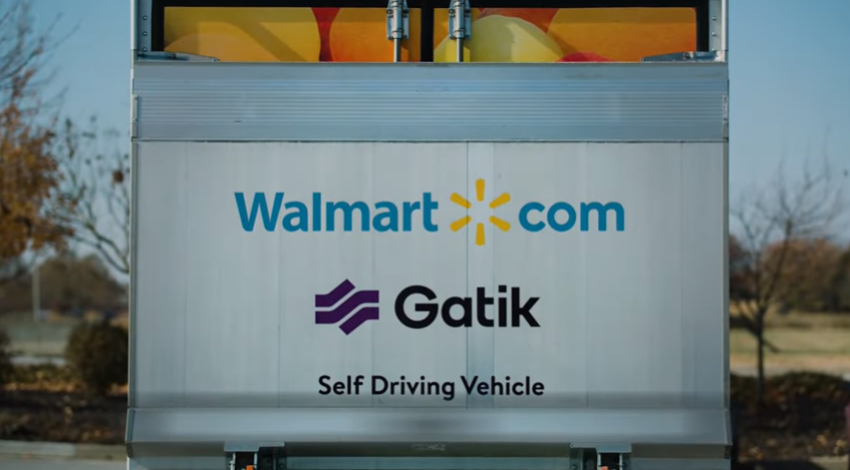Walmart now using fully driverless trucks as automation speeds up in wake of pandemic

Two years after partnering with autonomous vehicle startup Gatik AI to get goods delivered using autonomous vehicles, multinational retail giant Walmart Inc. said it is beginning to use fully driverless trucks to deliver online grocery orders in Arkansas.
Gatik, founded in 2017 by veterans of the autonomous technology industry with established offices in Palo Alto, California, and Toronto, Ontario, is on a mission is “to deliver goods safely and efficiently using autonomous vehicles,” according to its website. The company’s focus is on “short-haul, business to business logistics for the retail industry.”
In 2019, after receiving approval from the Arkansas Highway Commissioner’s office to launch a commercial service, the company began shuttling goods for Walmart in Bentonville using two self-driving box trucks with a safety operator behind the wheel.
In a first for the autonomous vehicle industry, Walmart and Gatik announced Monday that the trucks are now operating without a safety driver.
“We’re thrilled to be working with Gatik to achieve this industry-first, driverless milestone,” Walmart Senior Vice President Tom Ward said in a statement. “Through our work with Gatik, we’ve identified that autonomous box trucks offer an efficient, safe and sustainable solution for transporting goods on repeatable routes between our stores.”
Gatik CEO Gautam Narang told CNBC that “taking the driver out is the holy grail of this technology.”
“Having the trust from the world’s largest retailer has been a massive boost for what we do and is a validation for our technology, our solution, our progress,” Narang stressed.
Since Gatik began moving goods for Walmart in Arkansas and Louisiana and Loblaw Companies Limited in Ontario, it has expanded into Texas following a Series B fundraising round of $85 million, according to Tech Crunch.
The company now has a fleet of 25 self-driving trucks operating in Arkansas, Louisiana, Texas, California and Canada.
Gatik began its driverless operations in August, according to TechCrunch. The company has five self-driving trucks operating in Arkansas for Walmart, including the two fully driverless vehicles, which operate seven days per week. The trucks run a 7.1-mile route between a Walmart fulfillment center and a neighborhood market.
However, the company still keeps an employee in the passenger seat of the driverless trucks as a safeguard, and they only operate in fair weather conditions.
“It took us about 24 months since our commercial launch to get to a point where we could safely take the driver out,” Narang, who says his goal is to scale fully driverless operations across its other sites at a faster pace, told TechCrunch. “That time to unmanned will be reducing over time. Basically, getting to fully driverless operations in new markets and in new routes will become faster.”
The technological breakthrough comes just three years after 2020 Democratic presidential candidate Andrew Yang warned in his 2018 book, The War on Normal People, that America is careening toward a dystopian future without jobs due to increased automation and technological advances.
Yang, who proposed giving every adult citizen $1,000 a month in universal basic income to blunt the blow from automation, noted at the time that more than 4 million jobs had already been destroyed by robots, software, artificial intelligence, and a third of all American workers were “at risk of permanent unemployment.”
“And this time, the jobs will not come back,” he warned.
Among the industries he predicted would be hardest hit is trucking.
The Government Accountability Office released a report in 2019 outlining how federal agencies were not doing enough to prepare for the eventual automation of the trucking industry as consulting firm McKinsey and Company estimated that some 50% of all work activities will be automated by 2055 or sooner.
“We are confident that between 2 million and 3 million Americans who drive vehicles for a living will lose their jobs in the next 10 to 15 years. Driving a truck is the most common occupation in 29 states,” Yang wrote in his book.
“Self-driving vehicles are one of the most obvious job-destroying technologies, but there are similar innovations ahead that will displace cashiers, fast food workers, customer service representatives, administrative assistants, and even well-paid white-collar jobs like wealth managers, lawyers, and insurance agents,” he added.
“Our economic engine is stalling out in many places, and automation is eliminating livelihoods for hundreds of thousands of the most vulnerable Americans in regions across the country. New jobs are less numerous, are most often created in towns located far from those most hard hit, and require far different skills than the ones that are being lost."



























